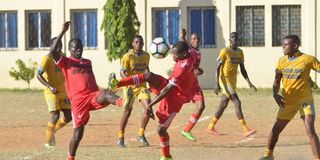Premium
End ‘mamluki’ menace in school games

Match between Changamwe Combine Football team and Mvita Combine at a past event in Mombasa.
As a teacher in Tana River, where I train a spirited group of boys in volleyball, I’ve seen the fire in their eyes as they dive for a ball or leap for a spike.The Kenya Secondary Schools Sports Association (KSSSA) ball games are their stage, as they dream of rising above the arid landscape and achieving national glory.
But that dream is under threat, thanks to impostors—known as “mamluki” or mercenaries—who have infiltrated school games, robbing deserving students of their moment and killing the spirit of fair play.
For decades, KSSSA games have been Kenya’s crucible for unearthing sporting talent. Yet schools are fielding overage players or non-students to win titles.
In 2022, Friends School Bukembe was slapped with a two-year ban for using an ineligible player in the football finals—a rare victory for accountability. But such cases are mere ripples in a sea of unchecked cheating.
Why does this happen? Fame and money. A national title brings a school prestige, media spotlight and sometimes hefty sponsorships. Some principals and coaches, seduced by glory, recruit mercenaries—often older, semi-professional athletes or dropouts. The effects are heartbreaking.
Picture a 16-year-old volleyballer from Tana River, sweating through drills under the scorching sun, only to face a 25-year-old “mamluki” . I have seen it happen. Last year, my boys played a county-level match against a team with players who looked suspiciously mature. We lost, and the defeat crushed their morale. One of my best spikers, stopped showing up for practice. “Coach, what’s the point?” he asked. This isn’t just a lost game; it’s a stolen future.
KSSSA must act decisively. First, enforce rigorous eligibility checks. Birth certificates and school records should be verified at every level. Biometric systems could ensure players match their documented ages. Make penalties hurt—longer suspensions and fines. Protect whistleblowers—a confidential reporting system could embolden them. Finally, media and sponsors should spotlight schools that nurture talent, not those chasing trophies at any cost.
As I watch my boys train, I think of their dreams—to spike a ball at Nyayo Stadium, to make their families proud. I want them to face peers, not “mamluki”.
Newton Maneno, Tana River

